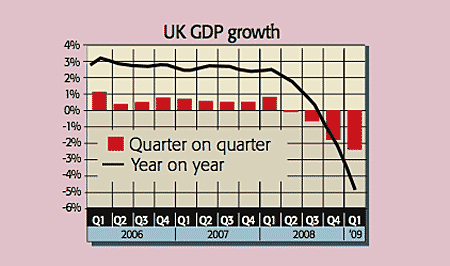
The economy’s performance in the first quarter was “devastatingly bad”, said Allister Heath in City AM. Revised figures out this week revealed a 2.4% drop in GDP between January and March, the worst quarter since 1958.
The year-on-year decline was 4.9%, the largest since official records began just after the war. Meanwhile, shortly after Bank of England governor Mervyn King launched an unprecedented public attack on the government’s “extraordinary” borrowing levels, the government outlined yet more spending plans.
What the commentators said
The second quarter should show an improvement, said Damian Reece in The Daily Telegraph. In hard times, firms intensify an overall fall in demand by running down inventories rather than making or ordering more goods. Once inventories have been used up “they have to start spending again” and overall activity ticks up.
But the question is whether the temporary boost from the inventory bounce can be sustained and on this front “it is hard to find solid sources of hope”, as Nils Pratley put it in The Guardian. Consumption slumped in the first quarter, but with the savings rate still only at 3%, “the process whereby consumers wean themselves off their dependency on debt” has “further to go”, said Larry Elliot on Guardian.co.uk.
Borrowing, “even for the creditworthy”, remains tough. Lending to businesses has fallen in seven of the past 12 months, dropping by 0.1% in May, while May’s net mortgage lending figure was the weakest since records began in 1993.
A key problem for banks is that they used to fund lending via the wholesale markets, said Anthony Hilton in the Evening Standard, and these markets are still not working properly. As Mervyn King said last week, that means banks will probably need yet more capital to boost lending enough to finance a sustained recovery.
Given the record public deficit, the fiscal stimulus will have to be withdrawn with spending cuts and tax hikes, while the lack of a credible plan to tackle it could “strangle the recovery just as it is getting started”, said Hugo Duncan in the Evening Standard. International investors could lose confidence in the UK, implying a slide in sterling and higher interest rates. Note that overseas investors ditched gilts in record numbers between March and May, said Gary Duncan in The Times.
Forget about a V-shaped recovery: with the economy looking “extremely fragile”, as Reece put it, we face a long, hard slog.